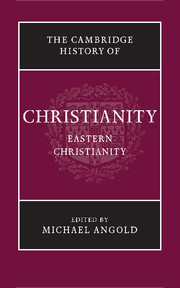Book contents
- Frontmatter
- PART I THE ECUMENICAL PATRIARCHATE
- PART II THE RUSSIAN CHURCH
- PART III EASTERN CHRISTIANITIES
- 16 Eastern Christianities (eleventh to fourteenth century): Copts, Melkites, Nestorians and Jacobites
- 17 The Armenians in the era of the crusades 1050–1350
- 18 Church and diaspora: the case of the Armenians
- 19 Church and nation: the Ethiopian Orthodox Täwahedo Church (from the thirteenth to the twentieth century)
- 20 Coptic Christianity in modern Egypt
- 21 Syriac Christianity in the modern Middle East
- PART IV THE MODERN WORLD
- Bibliography
- Index
- References
20 - Coptic Christianity in modern Egypt
from PART III - EASTERN CHRISTIANITIES
Published online by Cambridge University Press: 28 March 2008
- Frontmatter
- PART I THE ECUMENICAL PATRIARCHATE
- PART II THE RUSSIAN CHURCH
- PART III EASTERN CHRISTIANITIES
- 16 Eastern Christianities (eleventh to fourteenth century): Copts, Melkites, Nestorians and Jacobites
- 17 The Armenians in the era of the crusades 1050–1350
- 18 Church and diaspora: the case of the Armenians
- 19 Church and nation: the Ethiopian Orthodox Täwahedo Church (from the thirteenth to the twentieth century)
- 20 Coptic Christianity in modern Egypt
- 21 Syriac Christianity in the modern Middle East
- PART IV THE MODERN WORLD
- Bibliography
- Index
- References
Summary
Christian presence in modern Egypt
The word Copt derives from the Greek for an inhabitant of Egypt (Aiυπτος), arabised into ‘Qibt’ and thence into ‘Copt’, and has been used in modern times, especially since the sixteenth century, to designate the Christian inhabitants of Egypt and the language used by them in their liturgy. According to the church historian Eusebius (Ecclesiastical History 2: 16, 24), reflecting the traditions of his day, the evangelist Mark first preached the Gospel in Alexandria, and the Coptic Church claims an unbroken succession of patriarchs from that time to the present. Since the fourth century the church in Egypt has dated events from the accession of Diocletian as emperor in 284, heralding a period later referred to as the age of the martyrs because of the numerous victims of persecution, who included the patriarch Peter (d.311). The Arab invasion and conquest of Egypt in the seventh century was marked by a series of Coptic revolts, which were suppressed with increasing severity and violence.
By the twelfth century, the Christians had ceased to be a majority. Thereafter the Copts continued to decline as a proportion of the overall population, until stabilising in the early nineteenth century. As a sign of their submission to Islamic authority they were obliged to pay tribute and special taxes, in particular jizya and the kharaj. The doctors of Islamic law tended to draw quite distinct boundaries between Muslims and non-Muslims, and to interpret the subjection of dhimmîs to Islamic authority as a justification for discriminatory and humiliating measures imposed upon them.
- Type
- Chapter
- Information
- The Cambridge History of Christianity , pp. 488 - 510Publisher: Cambridge University PressPrint publication year: 2006
References
- 2
- Cited by

